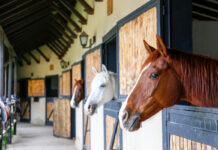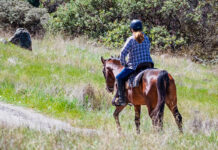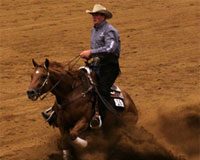Trail riding is a lot of fun. Add some friends to the mix, and you take it to a whole new level. Group trail rides can be a great way to spend time with your buddies and make friends. By participating in group rides, you’ll have opportunities to discover places you normally may not get to explore and meet different people and horses.

Types of Rides
A group ride can be anything from an impromptu get-together with a few riders at your boarding stable, or an organized excursion held by a local riding club. Certain trail competitions, like endurance or competitive trail rides, can also be considered group rides because a gathering of horses and riders are heading out together on the trail.
Small, informal rides are the best kind for getting both you and your horse accustomed to traveling down the trail with other horses and riders. This will enable you to see how your horse responds to being in a group, and whether you can handle him. Continuously riding in small groups will help your horse prepare for being in a larger group.
Eventually, you can sign up for larger rides that might have 50 horses or more. These are often sponsored by organized groups, such as local Equestrian Trail International clubs or recreational riding associations.
Getting Started
If you are used to riding alone or with only one or two other riders, you probably won’t know for sure how your horse will behave when he’s part of a bigger group. Be prepared for the energy of a group—whether it’s four horses or 40—to be very exciting for him.
The best way to ensure you have a good time on your horse’s first group ride is to make certain that he’s completely reliable in the arena. He should listen to you without hesitation.
Your horse also needs to be able to focus on you when you’re on the trail alone or with just one other horse. Whatever issues he has will only be magnified when you are with a larger group.
Before heading out with a group for the first time, longe your horse or work him in a round pen. Getting the excess energy out before he’s asked to keep himself together around strange horses will help you stay in control.
If your horse has proven himself to be quiet and relaxed around other horses, you’re in luck. But if he gets cranky when other horses are near him—pinning his ears, threatening to kick, or getting overly excited—you should work on this before you put him in a large group. Ask a few friends to ride with you, and when your horse misbehaves, correct him to let him know this behavior is unacceptable. You will most likely have these issues when you are riding in a big group later on, but if you’ve already let your horse know what behavior you expect of him, it will be easier for you to get him under control.
Practice putting your horse in different positions within a small group of friends as well. Ask him to lead for a while, then put him in the back. Place him in the middle at some point during the ride, too, all the time schooling him to behave no matter where he is in the group. Be aware that some horses have preferences and want to either be in the front or the back. The best way to deal with this issue is to repeatedly ask them to switch positions during the ride.
Part of the Group
Although it may be tempting to go on a group ride because of the locale, take care to learn more about the people you’ll be riding with before you sign up. Find out how many horses will be on the ride (the more horses, the more mentally challenging it will be for your horse), the general level of horsemanship expected, and the pace (the faster the pace, the more excited the horses can get).
It’s also a good idea to ask questions about safety before you commit to any group ride. Find out what kind of terrain you’ll be riding on, and what the group rules are. Do they allow people to ride bareback or double? Are stallions permitted on the ride? Can people bring alcohol? When asking these questions, you’ll get a sense of the value the group puts on safety. Any group that permits bareback and double riding or the consumption of alcohol on the trail is not putting safety first. Rides that allow stallions can be safe as long as the person riding the stallion knows how to handle him. If you’ll be riding a mare—especially one that might be in season at the time of the ride—you may want to consider choosing a group without stallions.
Riding Etiquette
In order to maintain safety in a group no matter the size, you should follow certain basic rules of etiquette.
- Kicker warning. If your horse is sensitive about having other horses close to his rear end or coming up alongside him and has been known to kick out, warn other riders by tying a red ribbon at the top of your horse’s tail.
- Passing. When riding in a group, it’s inevitable that horses will travel at different paces. If you need to pass someone along the trail, let the rider know you are coming up behind to pass. The other rider should pull over to the right side of the trail and let you pass on the left (depending on the terrain; if there is only one safe side to pull over, use that one). Always pass at a walk. If you trot or canter past, you could upset the other horse and put the rider in a dangerous situation. Likewise, if someone needs to pass you, pull over to the right side of the trail.
- Keeping distance. Bunching up is a common problem on group rides. Horses like to be together for security and will try to follow each other nose to tail. Keep your horse at least a horse’s length behind those in front of him on a narrow trail. This will prevent him from getting kicked if the horse in front of you feels crowded.
- Stop for mounting. If you pass another rider on the trail who has dismounted, stop and offer help. If the rider is OK and preparing to remount when you arrive, stop your horse and wait until the rider is securely in the saddle. If you walk past the horse while someone is attempting to mount, the horse may move off, endangering the rider.
- Spooking horses. If another rider in the group is having trouble getting her horse under control, stop and wait until the horse is manageable before you proceed.
- Water manners. When allowing your horse to drink from a creek or a water trough while on a group ride, be mindful of other horses. When he’s finished drinking, make room for others, but don’t ride off while another horse is in the middle of sipping water. Because horses are herd animals, if you walk away while another horse is drinking, that horse is likely to abruptly stop his water intake and try to follow you. This can pose a real problem because horses that don’t drink enough on a long ride may become dehydrated and sick.
If you prepare your horse ahead of time and choose the right setting, you will find that group rides can be a lot of fun. You’ll not only discover new places to ride and make new friends, but you’ll also develop an even stronger bond with your horse.
Liked this article? Here are others on trail riding:
3 Trail Riding Challenges
The Trail Rider’s Social Network
Trail Survival Guide
AUDREY PAVIA is a freelance writer based in Southern California and the author of Horses for Dummies.
This article originally appeared in the August 2014 issue of Horse Illustrated magazine. Click here to subscribe!






c
Great tips.